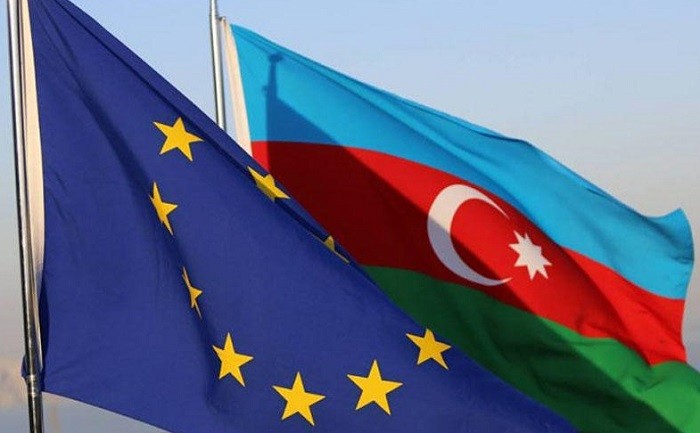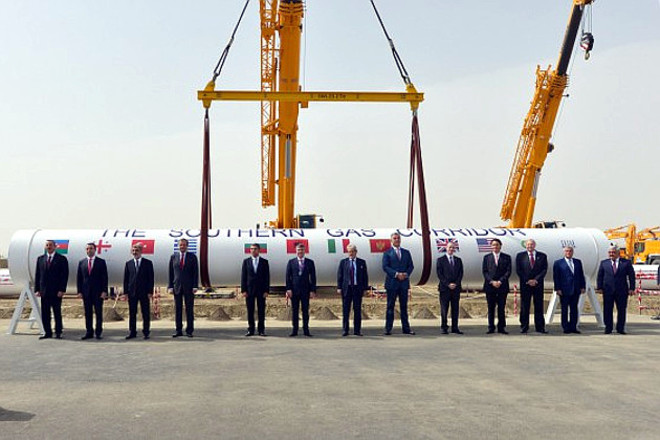Ambassador of Azerbaijan to Belgium Fuad Isgandarov, speaking to EurActiv, told about how Baku sees the future of its relations with the European Union and its members.
- The EU will start negotiations for a Comprehensive Agreement with Azerbaijan, which will replace the Association Agreement, proposed in 2010. Was Azerbaijan the first to present a new project?
- Yes, Azerbaijan became the first country in the history of the European Union, which submitted a new draft agreement, being a partner country. This has never happened before, because usually the EU proposes a project and then both sides work on it. Why did this happen? In our opinion, relations have a future if they are strategic, future-oriented and equal. This are the most important elements of the new agreement, which was presented at the Riga Summit. Azerbaijan intends to cooperate with the EU as a real partner in various fields - in the energy sector, in the framework of the Eastern Partnership, the security issues and the migration management. But we do not expect any miracles from this collaboration, we have a pragmatic view on it. All the elements of the political dialogue must be based on a solid foundation. For example, the Southern Gas Corridor and transport infrastructure may be a good economic foundation for our cooperation, both now and in the future. Azerbaijan is an important transport junction between Asia and Europe, and we have a solid basis for a political dialogue. These processes should be synchronized. Therefore, we are pleased that the European External Action Service has a mandate to negotiate with Azerbaijan. We hope that the negotiations will begin in the near future. They can be difficult, but I am sure that the result will be known in the coming months.
-You mentioned the Southern Gas Corridor. It is expected that it will start shipping Azerbaijani gas to Europe by 2020, and this will be the first real diversification of gas supply from the East. How important is this project from an economic and political point of view?
- This project is important for both the EU and Azerbaijan. It is important for the countries and companies involved in the project, and it is about a real project management. Two EU member states are involved in this project - Italy and Greece, the two candidate countries - Turkey and Albania, and Azerbaijan is a strategic partner in the field of energy. Four different types of countries were involved: member states, candidate countries, associated partners and future strategic partners. This is a real project management. We are talking about energy, about the future of Europe, which we regard as a market, as a source of income, and as a result the project becomes a solid basis for a practical political dialogue.

- Azerbaijan is considered an example of multiculturalism. Is your country concerned about populism in Europe, which is aimed against refugees and Islam?
- Azerbaijan is a country where civilization and culture are connected, it is a crossroads of civilizations. Unfortunately, historically, such intersections become battlefields. We managed to build a "bridge" and we are pleased with it. I think our experience can be useful for our European friends. Because Azerbaijan is a country with a predominantly Muslim population, and we have a very balanced approach to a secular and European lifestyle. Unlike other countries, for us it not difficult to work within the framework of the Eastern Partnership. Of course, there are many problematic issues in Europe, but I am sure that European civilization will survive. It survived two world wars and has become even stronger. Using its strong partnerships with European neighbors, I think the member states will overcome all the obstacles.
- The Nagorno-Karabakh conflict has remained unresolved for 25 years. This territory belongs to Azerbaijan but it is populated exclusively by Armenians, as all Azerbaijanis were forced to leave the region. How do you see the beginning of a dialogue, which could lead to the resolution of the conflict? Should the European Union play a more active role in resolving the conflict?
- Speaking about the conflict, you need to take into account that 20% of the Azerbaijani territory are occupied by Armenia. Azerbaijanis do not live in the occupied territories. There are more than one million refugees. It is a huge problem for Azerbaijan, and we tried to find a solution - we started a diplomatic dialogue, organized direct meetings between officials of the two countries. But the goals of the parties involved in the negotiation process are completely different. Armenia would like to maintain the status quo, but other interested parties want to change it, because it is unacceptable when one country of the Eastern Partnership occupies the territory of another country. I think we need to bring the European Union to speak about it more actively. There were a lot of resolutions, declarations of support for Azerbaijan's territorial integrity on the part of officials and institutions of the European Union, a new global strategy, as well as the November conclusion on the Foreign Affairs were adopted. It is clear that the European Union supports the territorial sovereignty of all countries inside and outside the EU. It is crucial for us. In the case of Georgia and Moldova, the EU is involved in the resolution of conflicts, but in our case it is not. We would like to see a clear position of the EU, which must comply with international law. Now we see it.
- How do you react to the criticism of human rights and violations of press freedom?
- Nobody is perfect in this world. In the case of such criticism, we are ready for a real, constructive dialogue. But we are not ready to accusations, voiced by some politicians, and we appropriately respond to these allegations. The Inter-parliamentary relations between the Azerbaijani Parliament and the European Parliament have been frozen for more than a year. We froze our participation in the Euronest, the Parliamentary Cooperation Committee and other institutions due to the absolutely biased and unfounded resolution of the European Parliament, adopted in September 2015. However, there was no attempt made to hear us, understand our vision and hear what we want to say. In September, a special delegation of MEPs, the members of the Council of Europe and the European Commission was sent to Baku. They managed to revive the relations between the parliaments on the basis of statements adopted by the co-chairs of the Euronest and the Parliamentary Cooperation Committee. Such dialogue is of great importance for solving problems. Meanwhile, I'm not sure that Azerbaijan's issues are more difficult than those of the most EU member states. A lot of things happened, but we have never criticized our partners and have not attempted to use these issues to make, or encourage them to do something. Rather than criticize, we always try to support a settlement of the problems, a constructive dialogue. If we talk about the problems of refugees, we are ready to invite our friends and share our experience with them. We are ready for cooperation on the issues of migration, the fight against terrorism, illegal immigration and organized crime. And we are taking joint actions. Of course, we can blame each other, but if we have problems, we should discuss their through normal diplomatic channels. And we do. In Autumn, we discussed the human rights issue in Baku with the EU representatives in a very friendly, sincere and constructive manner. I think it is the best way to find solutions to problems.

- As well as other countries - exporters of energy resources, Azerbaijan suffered from the volatility of oil prices. What are your country's plans for the development of non-oil and non-gas sector?
- Recently, a roadmap for the so-called post-oil era of Azerbaijan was adopted. Diversification of the economy is one of the major priorities of Azerbaijan in the coming years. Of course, we will continue our activities in the field of energy. This also applies to the Southern Gas Corridor and SOCAR activities in other countries. All the opportunities available to us, such as transport, information technology, agriculture and trade will be used for economic development. We would like to have a robust and constructive dialogue with our friends in the EU, because they have such an experience. They would like to share their vision of what we can do together to achieve the diversification of the economy, to make our state less dependent on oil and gas prices. We can use this approach, and you will see the results very soon.
- There are many forces inside and outside the European Union, which would like to destroy the EU. Is it more valuable for Azerbaijan to deal with the EU or individual member states?
- In our view, such approach is not critical. We have no problem of bilateral relations with EU member states. We maintain exclusive partnership and friendly relations with the majority of those at the bilateral level, but we are seriously working on the multilateral level. Since 1992, the European Union has allocated 982 million euro to support Azerbaijan. This support has fallen mainly on hard times. Now we do not need money. Now technologies, experience, educational projects, exchanges with the EU institutions are important for us. I am not sure that the Southern Gas Corridor project can be carried out without the cooperation with the EU institutions. Therefore, it is important to work in parallel with the EU institutions and member states. We are working in both directions. Considering the real crises, which the EU is facing, some of them come from outside. Therefore, we suggest our European friends to work together. Azerbaijan is ready for such cooperation in order to protect our native Europe. I think that if the decision is made, we will succeed.






